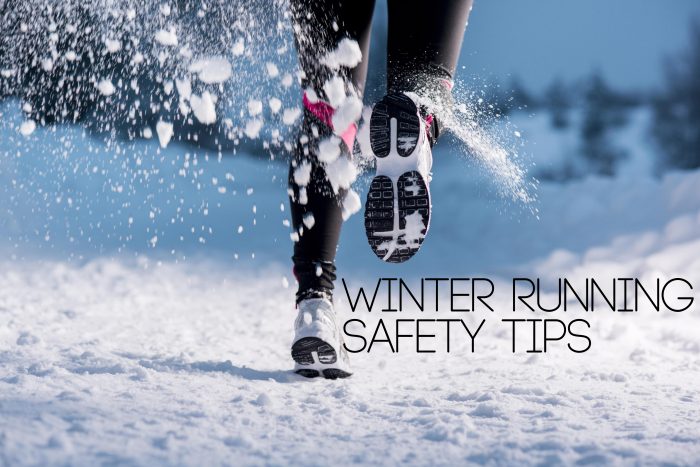Winter Running Safety Tips

It takes determination to run during the winter. When it’s frigid outside, most of us would rather stay bundled up in the heated indoors. For those of you with a New Year’s Resolution to get in shape, you may need to bare the cold and take a jog outside. Once you get adjusted to the temperature, keeping active in the cold weather can help protect you from seasonal depression and keep you in shape.
Exercising in cold weather can benefit your health in more ways than one.
- A little Vitamin D exposure can help defeat winter blues.
- Your body will produce endorphins as it fights to stay warm.
- When it’s cold, it becomes more strenuous work for your heart to distribute blood throughout your body, which can strengthen your heart muscle. (However, if you have heart problems, this can negatively impact your heart health.)
- More calories will be burned during an outdoor workout. This is because your body is working harder to maintain its core temperature.
You must prepare yourself to face the elements before you can reap the benefits. The following tips will help you prepare for your winter jog.
- Dress in layers. The first layer should be a synthetic material, such as polyester. Avoid wearing cotton. Polyester is light, breathable, and non-absorbent. If the temperature is cold enough, add an insulating layer, like fleece. You’ll only need an insulating layer if that temperature is below 10 degrees. Then, wear a wind/waterproof layer, such as nylon. As a rule of thumb, dress as if it’s much warmer than it is–once you start running, your body will warm up pretty quickly.
- Avoid running outside if the weather is below 0, or if the windchill hits negative temperatures.
- Wear a pair of wool socks and running gloves to keep your hands and feet warm. Our hands and feet lose heat quickly because the body is designed to keep our vital organs warm first. In cold temperatures, there is a reduction of blood flow through our feet and hands.
- In cold temperatures, our muscles tighten up more. This increases the risk of pulling a muscle while running outside in cold weather. Be aware of this, and try to take it easy on yourself during outdoor winter workouts.
- If you get wet, head home and change your clothes immediately. Wet clothes, cold weather, and wind do not mix well. These conditions lead to an increase in risk of hypothermia.
- Stay hydrated.
- Try to go on your runs when it’s daylight. Avoid running during sunrise or sunset, when the temperature is cold and it’s dark outside.
Do you have questions about your insurance? Find an insurance agent near you with our Agent Finder
Search All Blogs
Search All Blogs
Read More Blogs
March Potholes: Is Your Collision Coverage Ready for the “Crater Season”?
Road craters are appearing everywhere this March. Discover the insurance math behind pothole damage and how to keep your premiums from spiking.
Spring Skies and Structural Eyes: Why a March Roof Check is Your Best Insurance Policy
Don’t wait for a leak to check your roof. Learn how to spot late-winter damage and protect your home’s structure this March.
The Mystery of the Plastic Baby: A Guide to Mardi Gras and the King Cake
Why is there a baby in the cake? Discover the history and traditions of Mardi Gras 2026 and the delicious mystery of the King Cake.
Let the Good Times Roll—Safely: Mardi Gras Liability for Your Business
Hosting a Mardi Gras party this Tuesday? Make sure your business has the right event liability and liquor coverage before the beads start flying.
The Business “Prenup”: Why Business Partners Need Life Insurance in February
Love your business partner? Protect your company with a Life Insurance-funded Buy-Sell agreement to ensure the business survives the unexpected.
Heading South? Insuring Your Mid-Winter Break Road Trip in February
Driving to find some sun this week? Check your roadside assistance and rental car coverage before you leave the driveway.
Spring Dreams, Winter Schemes: Updating Your Insurance Before Your Spring Renovation
Planning a Spring kitchen remodel? Learn why you need to call your insurance agent before the contractors arrive to ensure your project is covered.
Shadow or Spring? The Quirky Science and Folklore of Groundhog Day 2026
Will he see his shadow? Dive into the history and humor of Groundhog Day 2026 and why we still trust a rodent with our weather forecasts.
Stocked for Love: Protecting High-Value Valentine’s Inventory with Business Insurance
Is your Valentine’s stock protected? Ensure your business insurance accounts for the massive inventory surge happening in early February.
New Life, New Responsibility: Why a February Arrival Means Updating Your Policy
Welcoming a new family member this February? It’s time to move life insurance to the top of your to-do list to ensure your child’s future is secure.










